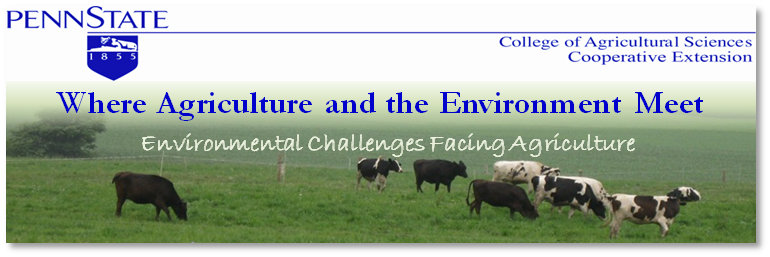The vast majority of farms in Pennsylvania are small enough that they only fall under the most basic of regulations. Therefore, many in the regulatory and environmental community are turning their attention to these farms. The question is often posed, "Is a 1,000-cow farm better or worse than and ten 100-cow farms?" The answer I've heard is that the ten 100-cow farms may be worse. Don't get me wrong, there are a number of very good small farms out there that are doing their best to protect the environment, but from a basic oversight standpoint they are not nearly as regulated, which leads state and federal agencies to wonder if they really are doing everything right.
I have tried to focus on smaller farms in my programming and gearing the Feed Management program towards the smaller farm would be a win win for the farmer and the plan writer. Because smaller farmers are not required to follow as many regulations as larger farms they do not have the "insurance" that oversight and regulations provide against lawsuits and other environmental inquiries. Although a Feed Management Plan is not required for any size farm, for smaller farms, it provides that oversight from a federal agency that could serve as that "insurance policy".
From the nutritionist's point of view, writing and implementing a plan on a smaller farm would be simpler (at least from a sample collection standpoint). I came to this conclusion as I was out taking manure samples from a farm with over 400 cows. This farm has graciously agreed to serve as a an example for a Feed Management plan writing workshop, and in order to have the best data available for the participants I was diligently following the manure sampling protocol. This protocol, in Pennsylvania, requires manure to be sampled from 15% of the cows in each group or a maximum of 20 cow. With three groups on this farm that turned into a whole lot of manure samples and since we try to take the samples directly from the cow to avoid contamination my arm was a little tired. After cow 25 and realizing I was only about halfway done I was wishing I had chosen a nice 40-cow farm as that would have required I only get samples from 6 cows! Since Feed Management Plan implementation requires that manure samples be taken four times a year, if I were a nutritionist I think I would focus on smaller farms and save myself a lot of manure sampling.
My last piece of advice for folks writing Feed Management plans is to focus on farms that want nothing to do with this program because those are probably the farms that need it the most. Although getting more farms involved in the program is important, the biggest impact could be gained by focusing on getting plans written for the farms that really need them instead of farms that are already doing a good job.


No comments:
Post a Comment